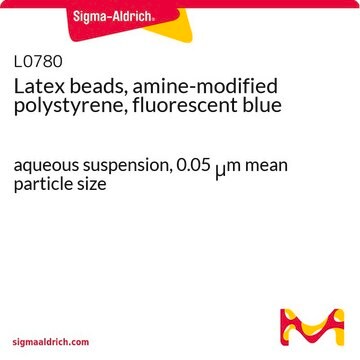66019
Nano beads based on polyacrylonitrile, Chromeon 642-marked, carboxylated
Synonyme(s) :
PAN-Chromeon 642, carboxylated
Se connecterpour consulter vos tarifs contractuels et ceux de votre entreprise/organisme
About This Item
Code UNSPSC :
12352200
Forme
liquid
Concentration
0.5%
Diamètre moyen
80-100 nm
Fluorescence
λex 642 nm; λem 677 nm in H2O
Température de stockage
2-8°C
Application
Nanobeads based on polyacrylonitrile, Chromeon 642-marked, carboxylatedis an effective vehicle for energy transfer with external fluorescent dyes and embedded dyes making them useful in FRET-based immunoassay applications such as protein nanoarray and quantum dot assays.
Code de la classe de stockage
12 - Non Combustible Liquids
Classe de danger pour l'eau (WGK)
WGK 3
Point d'éclair (°F)
Not applicable
Point d'éclair (°C)
Not applicable
Équipement de protection individuelle
Eyeshields, Gloves
Certificats d'analyse (COA)
Recherchez un Certificats d'analyse (COA) en saisissant le numéro de lot du produit. Les numéros de lot figurent sur l'étiquette du produit après les mots "Lot" ou "Batch".
Déjà en possession de ce produit ?
Retrouvez la documentation relative aux produits que vous avez récemment achetés dans la Bibliothèque de documents.
Les clients ont également consulté
Hye-Young Park et al.
Langmuir : the ACS journal of surfaces and colloids, 26(10), 7327-7333 (2009-12-25)
The generation of compact quantum dots (QDs) probes is of critical importance for visualizing molecular interaction occurring in biological context, particularly when using the Förster resonance energy transfer (FRET) approach. This Article reports novel water-soluble compact CdSe/ZnS QDs prepared by
R Bruck et al.
Biosensors & bioelectronics, 26(9), 3832-3837 (2011-03-23)
We report the development of a Mach-Zehnder interferometer biosensor based on a high index contrast polymer material system and the demonstration of label-free online measurement of biotin-streptavidin binding on the sensor surface. The surface of the polyimide waveguide core layer
Phat L Tran et al.
Analytical and bioanalytical chemistry, 398(2), 759-768 (2010-07-24)
An alternative approach for fabricating a protein array at nanoscale is suggested with a capability of characterization and/or localization of multiple components on a nanoarray. Fluorescent micro- and nanobeads each conjugated with different antibodies are assembled by size-dependent self-assembly (SDSA)
Notre équipe de scientifiques dispose d'une expérience dans tous les secteurs de la recherche, notamment en sciences de la vie, science des matériaux, synthèse chimique, chromatographie, analyse et dans de nombreux autres domaines..
Contacter notre Service technique
